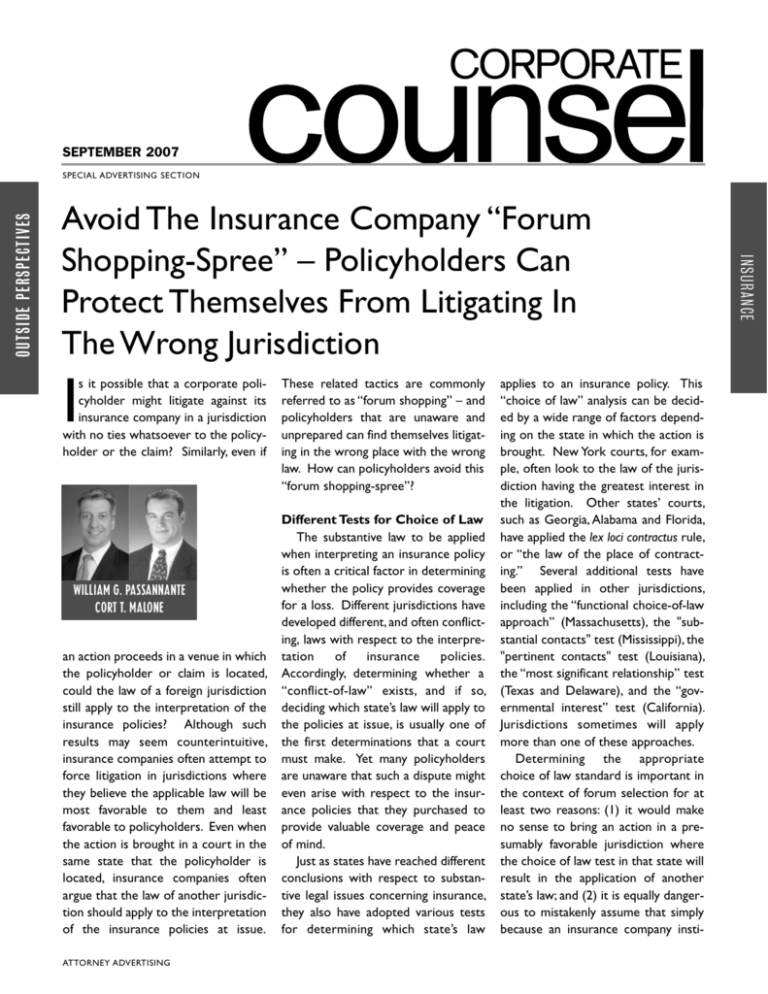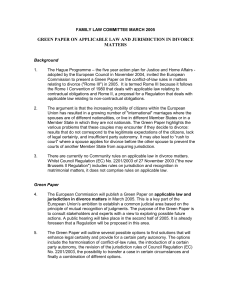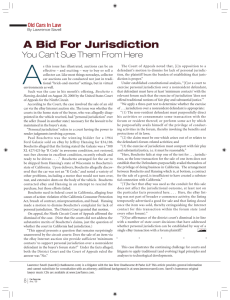
SEPTEMBER 2007
Avoid The Insurance Company “Forum
Shopping-Spree” – Policyholders Can
Protect Themselves From Litigating In
The Wrong Jurisdiction
s it possible that a corporate policyholder might litigate against its
insurance company in a jurisdiction
with no ties whatsoever to the policyholder or the claim? Similarly, even if
I
WILLIAM G. PASSANNANTE
CORT T. MALONE
an action proceeds in a venue in which
the policyholder or claim is located,
could the law of a foreign jurisdiction
still apply to the interpretation of the
insurance policies? Although such
results may seem counterintuitive,
insurance companies often attempt to
force litigation in jurisdictions where
they believe the applicable law will be
most favorable to them and least
favorable to policyholders. Even when
the action is brought in a court in the
same state that the policyholder is
located, insurance companies often
argue that the law of another jurisdiction should apply to the interpretation
of the insurance policies at issue.
ATTORNEY ADVERTISING
These related tactics are commonly
referred to as “forum shopping” – and
policyholders that are unaware and
unprepared can find themselves litigating in the wrong place with the wrong
law. How can policyholders avoid this
“forum shopping-spree”?
Different Tests for Choice of Law
The substantive law to be applied
when interpreting an insurance policy
is often a critical factor in determining
whether the policy provides coverage
for a loss. Different jurisdictions have
developed different, and often conflicting, laws with respect to the interpretation
of
insurance
policies.
Accordingly, determining whether a
“conflict-of-law” exists, and if so,
deciding which state’s law will apply to
the policies at issue, is usually one of
the first determinations that a court
must make. Yet many policyholders
are unaware that such a dispute might
even arise with respect to the insurance policies that they purchased to
provide valuable coverage and peace
of mind.
Just as states have reached different
conclusions with respect to substantive legal issues concerning insurance,
they also have adopted various tests
for determining which state’s law
applies to an insurance policy. This
“choice of law” analysis can be decided by a wide range of factors depending on the state in which the action is
brought. New York courts, for example, often look to the law of the jurisdiction having the greatest interest in
the litigation. Other states’ courts,
such as Georgia, Alabama and Florida,
have applied the lex loci contractus rule,
or “the law of the place of contracting.” Several additional tests have
been applied in other jurisdictions,
including the “functional choice-of-law
approach” (Massachusetts), the "substantial contacts" test (Mississippi), the
"pertinent contacts" test (Louisiana),
the “most significant relationship” test
(Texas and Delaware), and the “governmental interest” test (California).
Jurisdictions sometimes will apply
more than one of these approaches.
Determining the appropriate
choice of law standard is important in
the context of forum selection for at
least two reasons: (1) it would make
no sense to bring an action in a presumably favorable jurisdiction where
the choice of law test in that state will
result in the application of another
state’s law; and (2) it is equally dangerous to mistakenly assume that simply
because an insurance company insti-
INSURANCE
OUTSIDE PERSPECTIVES
SPECIAL ADVERTISING SECTION
SEPTEMBER 2007
tutes an action in a particular jurisdiction, the law of that state necessarily
will apply. Thus, understanding the
effect of the conflict-of-law rules and
the choice of law tests in all potential
jurisdictions in which an insurance
coverage action might be initiated
is critical to both assessing the
correct jurisdiction in which a lawsuit
should proceed, and preventing an
insurance company from improperly
forcing a policyholder into the
wrong jurisdiction.
Insurance Companies’ SelfServing Arguments
When arguing in favor of their preferred forums, insurance companies
seemingly have no problem propounding divergent arguments on essentially
similar choice of forum and choice of
law issues. For example, in one recent
matter in New York Supreme Court,
OneBeacon America Insurance Company
v. NL, Inc., et al., Case No. 603429 (N.Y.
Sup. Ct., N.Y. County), Certain
Underwriters at Lloyd’s, London
opposed a defendant’s motion to dismiss a New York action in favor of a
subsequently filed Texas action in part
because the New York action was filed
first by almost six weeks. Certain
Underwriters argued in that case that
a delay of six weeks in filing a second
action required dismissal of the defendant’s later-filed action under NY
CPLR 3211(a)(4).
In a similar case, Certain
Underwriters filed an action in New
York after a more comprehensive lawsuit was filed in Connecticut. See
Certain Underwriters at Lloyd’s,
London, et al. v. Hartford Accident &
Indem. Co., 16 A.D.3d 167 (1st Dep’t
2005). The Appellate Division, in
affirming the lower court’s grant
of a motion to dismiss Certain
Underwriters’ New York action, held
that “Inasmuch as it was plain that this
action was motivated simply by plaintiffs’ wish to gain a tactical advantage
through forum shopping, the court
properly exercised its discretion in
dismissing the complaint pursuant to
CPLR 3211(a)(4).”
The court also noted that the
reinsurance policies at issue in the
case contained a “service of suit”
clause, which provided that Certain
Underwriters would submit to the
jurisdiction of any court of competent
jurisdiction in the United States, with
all matters determined in accordance
with the law and practice of
such court.
Hartford exercised
its contractual rights under this
provision and chose to litigate in
Connecticut.
According to the
Appellate Division, “that choice should
not be effectively undone by what
must be viewed under the circumstances as a purely expedient . . . New
York declaratory judgment action.”
Accordingly, applying a service of suit
clause, if one is present in the corporation’s insurance policies, could provide a basis for keeping an action in
the proper jurisdiction.
Conclusion: Know Where You
Belong
One of the unfortunate results of
the insurance companies’ “forum
shopping-spree” is the creation of a
“race to the courthouse” mentality in
insurance coverage litigation. As a
result, policyholders must educate
themselves regarding the appropriate
jurisdiction in which to resolve disputes with their insurance companies.
This fact and law-based determination
often involves examining numerous
factors including, among others, the
location of the corporation, the site of
the loss, and the place where the
insurance policies were sold and delivered. Experienced counsel often can
assist in quickly providing an education
regarding the various potential jurisdictions and the effect that the application of their law might have.
Policyholders should safeguard their
rights accordingly, or risk finding
themselves stuck litigating in a jurisdiction chosen by an insurance company on a “forum shopping-spree.”
William G. Passannante is a senior shareholder
and Cort Malone is an attorney in the New York
office of Anderson Kill & Olick, P.C. Mr.
Passannante and Mr. Malone regularly represent
policyholders in insurance coverage disputes.
Mr. Passannante can be reached at (212) 2781328 or wpassannante@andersonkill.com and
Mr. Malone can be reached at (212) 278-1382.
Anderson Kill has been ranked in the #1 category by Chambers USA 2007, the leading
research publication for the legal industry.
Chambers’ ‘America’s Leading Lawyers for
Business’ recognizes the firm’s excellent work in
its Insurance Recovery Practice in the top category nationwide and its individual attorneys in
New York, New Jersey, Philadelphia and Chicago
for Insurance Dispute Resolution. For more
information, please visit www.andersonkill.com.
Reprinted with permission from the September 2007 edition of The Corporate Counsel © 2007 ALM Properties, Inc. All rights reserved. Further duplication without permission is prohibited. For information, contact 212-545-6111 or visit www.almreprints.com. # 016-09-07-0001






